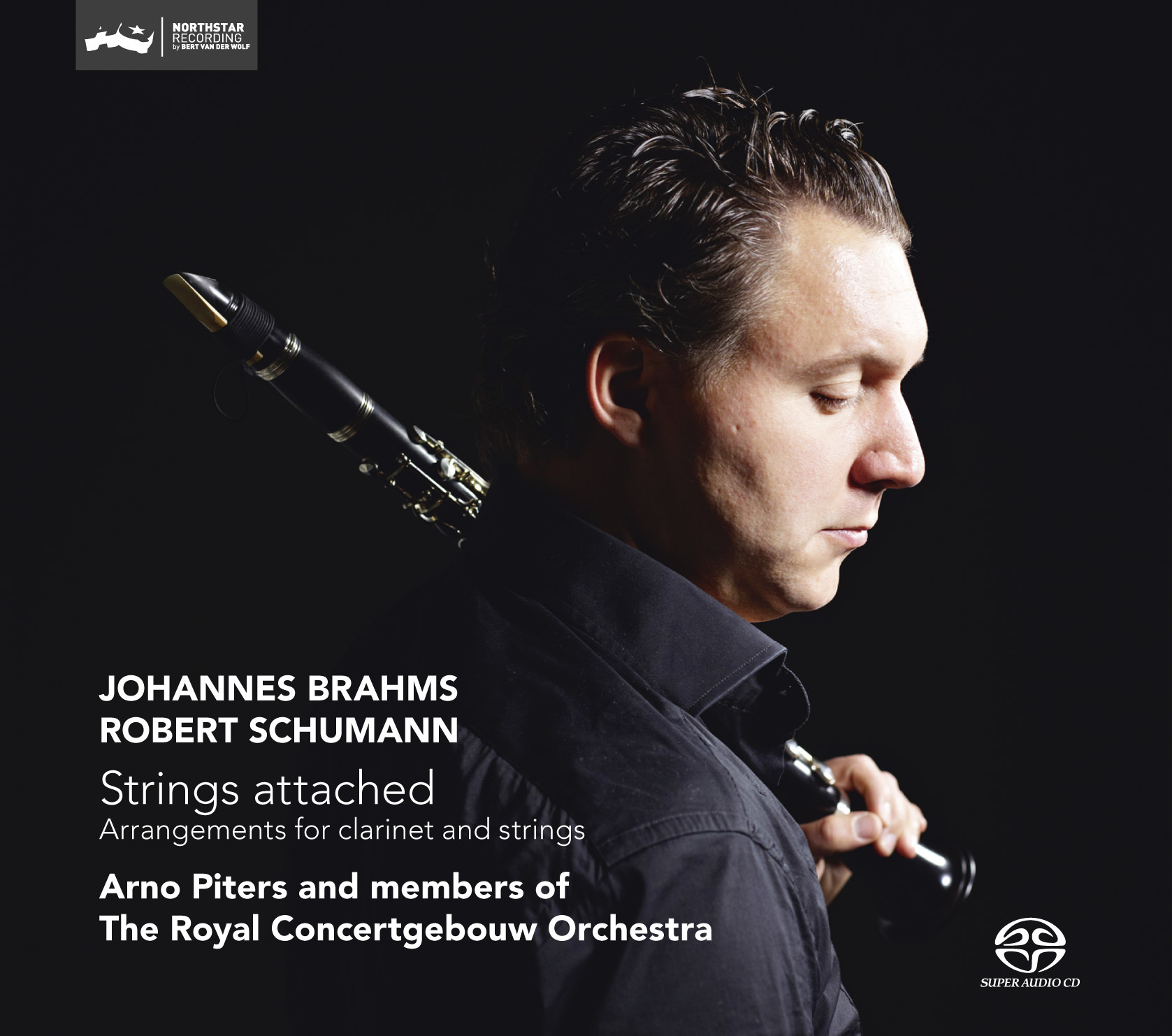
Arno Piters, Members Of The Royal Concertgebouw Orchestra – Brahms, Schumann: Strings attached (2013)
DSF Stereo DSD128/5.64 MHz | Time – 01:52:16 minutes | 5,22 GB | Genre: Classical
Studio Masters, Official Digital Download – Source: nativeDSDmusic | Booklet, Front Cover | © Challenge Records
People have been making arrangements of music for many centuries. This can take a variety of forms, from arranging existing melodies into partsong versions such as chorales or folk tunes to writing elaborate compositions based on a specific theme. Another common type of arrangement is writing for a different instrumentation than the original. Composers of today and yesteryear have adapted or “improved”, more or less drastically, their own compositions or those of other composers.
Until around the mid-eighteenth century adaptation was felt to be on a par with an original composition. Bach, for example, did not consider it beneath himself to adapt works of colleagues such as Vivaldi and Telemann for his own use. But with the rise of the genius cult in the mideighteenth century, arrangements of music began to decline in status. Even so, significant composers such as Mozart and Beethoven eagerly threw themselves into making new adaptations. Beethoven primarily arranged his own work for different instrumentations, making for more ways of performing it, but he also wrote arrangements for string quartets of parts of the Well-tempered Clavier; Mozart, too, wrote similar adaptations. Then and later, Bach’s music continued to be in demand as material for arrangers: both Mendelssohn and Schumann composed complete piano accompaniments to his music for solo violin and solo cello, and Mendelssohn modernised the instrumentation of the St. Matthew Passion to suit the taste of the period. But nineteenthcentury composers also frequently made arrangements of their own work. Schumann, for example, transformed his original Symphony No. 2 into Symphony No. 4. A widely known example is Bruckner’s propensity to revise his own works, which would later make authenticity a problem. And Mahler thought nothing of refreshing the instrumentation of symphonies by Beethoven and more particularly Schumann, a custom that was considered completely acceptable in that day and age. In time though, the “improvements” made by Rimsky-Korsakow to the music of his colleague Moussorgski acquired a bad name.
Tracklist:
01 – Clarinet Sonata No. 1 in F minor, Op. 120.1- I. Allegro appassionato
02 – Clarinet Sonata No. 1 in F minor, Op. 120.1- II. Andante un poco Adagio
03 – Clarinet Sonata No. 1 in F minor, Op. 120.1- III. Allegretto grazioso
04 – Clarinet Sonata No. 1 in F minor, Op. 120.1- IV. Vivace
05 – Fantasiestcke Op. 73- I. Zart und mit Ausdruck
06 – Fantasiestcke Op. 73- II. Lebhaft, leicht
07 – Fantasiestcke Op. 73- III. Rasch und mit Feuer
08 – Clarinet Sonata No. 2 in E-flat major, Op. 120.2- I. Allegro amabile
09 – Clarinet Sonata No. 2 in E-flat major, Op. 120.2- II. Allegro appasionato
10 – Clarinet Sonata No. 2 in E-flat major, Op. 120.2- III. Andante con moto, Allegro
Download:
mqs.link_CC72572BrahmsSchumannStringsattachedArnPitersMembersfRC2013DSD128.part1.rar
mqs.link_CC72572BrahmsSchumannStringsattachedArnPitersMembersfRC2013DSD128.part2.rar
mqs.link_CC72572BrahmsSchumannStringsattachedArnPitersMembersfRC2013DSD128.part3.rar
mqs.link_CC72572BrahmsSchumannStringsattachedArnPitersMembersfRC2013DSD128.part4.rar
mqs.link_CC72572BrahmsSchumannStringsattachedArnPitersMembersfRC2013DSD128.part5.rar
mqs.link_CC72572BrahmsSchumannStringsattachedArnPitersMembersfRC2013DSD128.part6.rar



















![Valentina Lisitsa - Tchaikovsky: The Complete Solo Piano Works (2019) [FLAC 24bit/96kHz] Valentina Lisitsa - Tchaikovsky: The Complete Solo Piano Works (2019) [FLAC 24bit/96kHz]](https://getimg.link/images/imgimgimg/uploads/2020/01/VQQ62Jx.jpg)
![Glenn Gould - The Complete Columbia Album Collection (2015 Remastered Edition) [Qobuz FLAC 24bit/44,1kHz] Glenn Gould - The Complete Columbia Album Collection (2015 Remastered Edition) [Qobuz FLAC 24bit/44,1kHz]](https://getimg.link/images/imgimgimg/uploads/2017/07/2bHwfbA.jpg)
![Itzhak Perlman - The Complete Warner Recordings 1972-1980 (2015) [FLAC 24bit/96kHz] Itzhak Perlman - The Complete Warner Recordings 1972-1980 (2015) [FLAC 24bit/96kHz]](https://getimg.link/images/imgimgimg/uploads/2019/12/IpmBmeR.jpg)
![Marco Schiavo & Sergio Marchegiani - Brahms: Hungarian Dances - Waltzes, Op. 39 (2018) [FLAC 24bit/96kHz] Marco Schiavo & Sergio Marchegiani - Brahms: Hungarian Dances - Waltzes, Op. 39 (2018) [FLAC 24bit/96kHz]](https://getimg.link/images/imgimgimg/uploads/2019/12/UGss5XE.jpg)
![Maurizio Baglini - Schumann: Kreisleriana, Davidsbundlertanze, Kinderszenen (2018) [FLAC 24bit/96kHz] Maurizio Baglini - Schumann: Kreisleriana, Davidsbundlertanze, Kinderszenen (2018) [FLAC 24bit/96kHz]](https://getimg.link/images/imgimgimg/uploads/2018/06/3s0Ucl9.jpg)

![Pacifica Quartet - Dmitri Shostakovich and his Contemporaries: The Soviet Experience Vol. 1-4 (2011-2013) [24bit FLAC] Pacifica Quartet - Dmitri Shostakovich and his Contemporaries: The Soviet Experience Vol. 1-4 (2011-2013) [24bit FLAC]](https://getimg.link/images/imgimgimg/uploads/2017/07/ntIbtOp.jpg)
![Robert Schumann - Scenen aus Goethes Faust, WoO 3 - Royal Concertgebouw Orchestra, Nikolaus Harnoncourt (2009) [Qobuz FLAC 24bit/88,2kHz] Robert Schumann - Scenen aus Goethes Faust, WoO 3 - Royal Concertgebouw Orchestra, Nikolaus Harnoncourt (2009) [Qobuz FLAC 24bit/88,2kHz]](https://getimg.link/images/imgimgimg/uploads/2017/04/C2ydFyh.jpg)
![Leonore Piano Trio - Arensky: Piano Trios (2014) [Hyperion FLAC 24bit/96kHz] Leonore Piano Trio - Arensky: Piano Trios (2014) [Hyperion FLAC 24bit/96kHz]](https://getimg.link/images/imgimgimg/uploads/2017/08/5QaV7KV.jpg)
![Netherlands Radio Philharmonic Orchestra, James Gaffigan, Ingo Metzmacher, Christoph Poppen, Michael Schonwandt, Markus Stenz, Osmo Vanska - Karl Amadeus Hartmann: Symphonies Nos. 1-8 (2014) [nativeDSDmusic DSF DSD64/2.82MHz] Netherlands Radio Philharmonic Orchestra, James Gaffigan, Ingo Metzmacher, Christoph Poppen, Michael Schonwandt, Markus Stenz, Osmo Vanska - Karl Amadeus Hartmann: Symphonies Nos. 1-8 (2014) [nativeDSDmusic DSF DSD64/2.82MHz]](https://getimg.link/images/imgimgimg/uploads/2019/01/xUV4HwU.jpg)
![The Brass of the Royal Concertgebouw Orchestra with Ivan Meylemans (2007) [Qobuz FLAC 24bit/88,2kHz] The Brass of the Royal Concertgebouw Orchestra with Ivan Meylemans (2007) [Qobuz FLAC 24bit/88,2kHz]](https://getimg.link/images/imgimgimg/uploads/2017/09/6WnFRcB.jpg)
![Piers Lane, Howard Shelley - Williamson: Complete Piano Concertos (2014) [FLAC 24bit/96kHz] Piers Lane, Howard Shelley - Williamson: Complete Piano Concertos (2014) [FLAC 24bit/96kHz]](https://getimg.link/images/imgimgimg/uploads/2017/01/PsKdW8Y.jpg)
![Marc van Roon Trio - Quantum Stories (2013) [DSF DSD128/5.64MHz] Marc van Roon Trio - Quantum Stories (2013) [DSF DSD128/5.64MHz]](https://getimg.link/images/imgimgimg/uploads/2018/12/g1rglHc.jpg)
![Anthony De Mare - Liaisons- Re-Imagining Sondheim From The Piano (2015) [Qobuz FLAC 24bit/44,1kHz] Anthony De Mare - Liaisons- Re-Imagining Sondheim From The Piano (2015) [Qobuz FLAC 24bit/44,1kHz]](https://getimg.link/images/imgimgimg/uploads/2016/06/z6cQaQ5.jpg)
![Netherlands Radio Chamber Philharmonic, Michael Schonwandt - Schumann: Symphonic Works (2013) [nativeDSDmusic DSF DSD128/5.64MHz] Netherlands Radio Chamber Philharmonic, Michael Schonwandt - Schumann: Symphonic Works (2013) [nativeDSDmusic DSF DSD128/5.64MHz]](https://getimg.link/images/imgimgimg/uploads/2018/12/PDtiCWb.jpg)